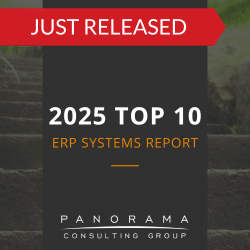 A successful and on-time ERP project never happens by accident. Behind every successful public sector ERP implementation is a project manager who has taken the time to define project scope, assess resource commitment and set expectations and priorities.
A successful and on-time ERP project never happens by accident. Behind every successful public sector ERP implementation is a project manager who has taken the time to define project scope, assess resource commitment and set expectations and priorities.
Although keeping a large-scale ERP project on-schedule is challenging for even the best project manager, we have several strategies for facilitating an on-time delivery:
1. Get Approval of Project Objectives and Scope: During the project charter meeting, the project manager should get sign-offs from the executive team on the project objectives and scope. By presenting the objectives and scope from the outset, there will be no surprises once the project schedule is more fully developed. Reaching a consensus at the outset also prevents the executive team from voicing concerns mid-project and suggesting changes that could cause significant scope creep.
2. Understand Your Team: Before randomly assigning tasks to various team members, the project manager should assess each member’s strengths and weaknesses. We’ve all worked with the brilliant engineer who has never met a deadline; the intern who seems to have enough energy to do the work of three people; or the marketing rep who always seems to be taking personal phone calls. Assessing team members doesn’t have to take place in one-on-one meetings – most managers should know their team members well enough to be able to give the project manager recommendations on who should fill certain positions and what types of contingency plans should be made for workers who are needed but not necessarily reliable.
3. Assign Critical Path Items to the Most Trusted Team Members: The most trusted team members should be assigned the critical path items that will make or break a project. They do not necessarily need seniority, but they do need to have earned respect from their team and be able to work well with many different types of people. Very few people have the time to perform very large tasks on their own, so having a team is crucial for delivering critical path items.
4. Set Upfront Expectations for Deliverables: People have different standards for what is an acceptable work product. Some think a rough draft scribbled on a napkin is acceptable whereas others are uncomfortable submitting anything that has not been professionally printed and bound. By setting expectations at the outset, the team will know what is an acceptable deliverable. Without setting expectations, scope creep can easily occur when assignments are rejected because of incompleteness or lack of professionalism.
5. Prioritize Tasks and Develop a Hierarchy: It is not unusual for a small group of people to be assigned to tasks in several different categories. By prioritizing tasks and developing a hierarchy, everyone will know what their key priorities should be and bottlenecks will be less likely to occur. When people are allowed to pick and choose their tasks, the low-hanging fruit is usually completed first and other tasks are placed on the backburner. Prioritization may require that the more difficult tasks be completed upfront because several subsequent groups rely on the information. By setting these priorities, there is no guesswork in the order of operation.
An ERP project manager who follows the tips above will lead their team to ERP success. Only an on-time and carefully planned ERP project will provide the innovation necessary to effectively serve citizens.
Learn more by checking out our on-demand webinar, How to Define the Best IT and ERP Strategy Roadmap for Your Organization.












